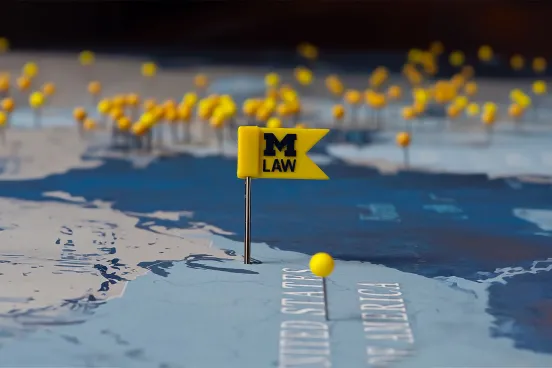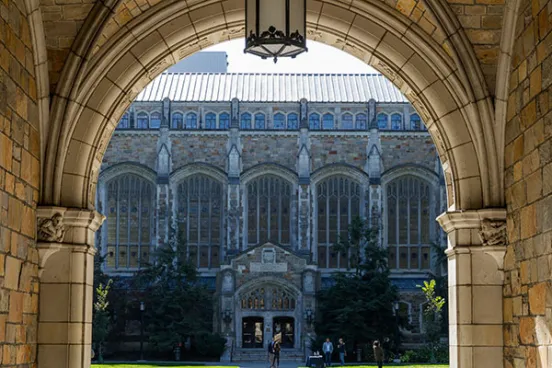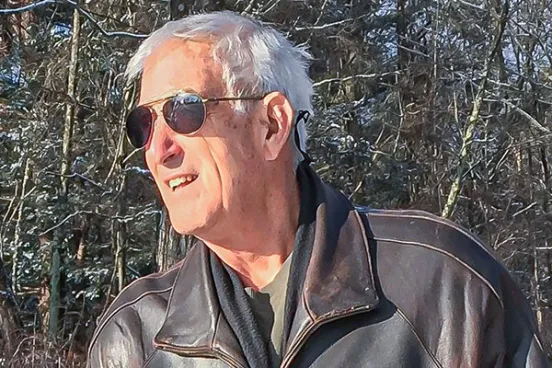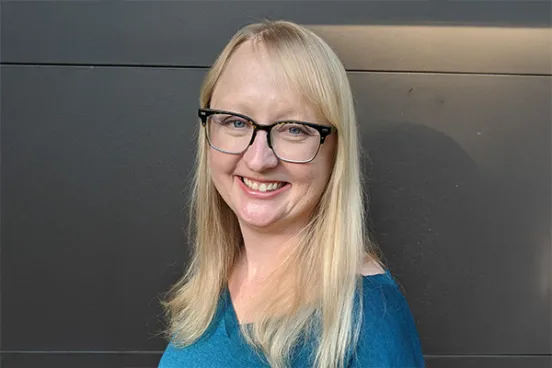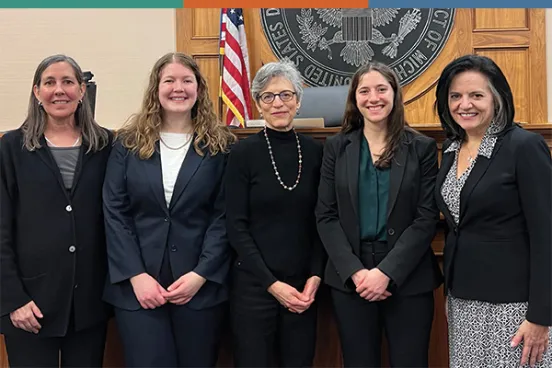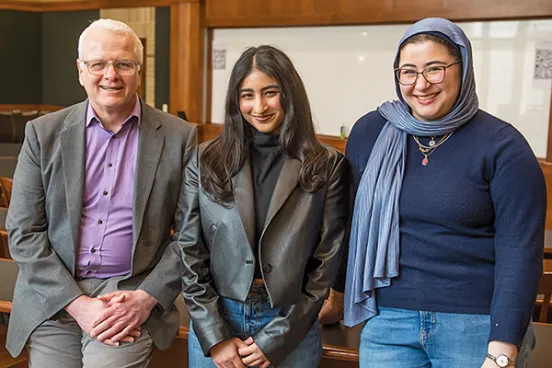The University’s founding statute required the law department to hire a faculty member devoted to international law. Ever since, Michigan Law has been uniquely committed to the study of law beyond our borders. Leading international law scholars like Eric Stein, Bill Bishop, and Whitmore Gray found their academic home here. To this day, the school remains committed to the idea that the best lawyers understand the law in a global context.
Law Quadrangle recently asked four of the Law School’s international law scholars three questions: What is the most interesting thing that you’re working on right now? What do you consider to be the most significant development in your area of law since you entered academia? And outside of your specific field, what is a recent piece of scholarship that caught your eye from another member of the faculty, and why?
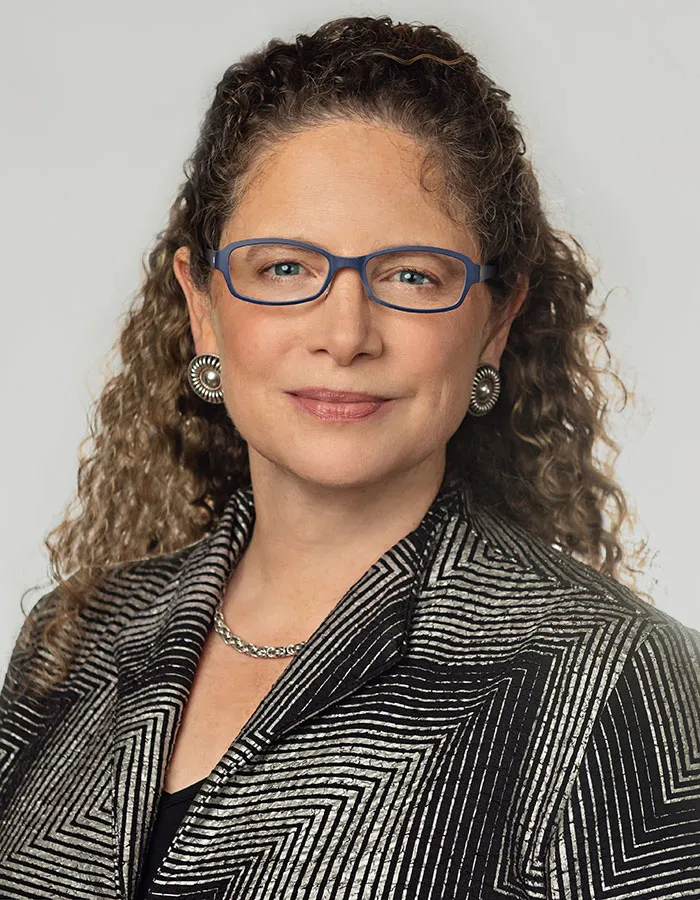
Karima Bennoune, ’94
Bennoune, ’94, the Lewis M. Simes Professor of Law, specializes in public international law and international human rights law, including issues related to culture, extremism and terrorism, and women’s human rights. She served as the United Nations special rapporteur in the field of cultural rights from 2015 to 2021. In September, Bennoune addressed the United Nations Security Council, urging it to go beyond condemnation of the Taliban’s violation of women’s rights in Afghanistan and adopt resolutions that label it gender apartheid.
Currently, I’m working to get the gender apartheid framework I theorized in “The International Obligation to Counter Gender Apartheid,” my recent journal article published in Columbia Human Rights Law Review, implemented and even codified explicitly in international law. In less than a year, this has gone from a law review article to a concept referenced even by the UN secretary-general and the high commissioner for human rights, and employed by the special rapporteur on Afghanistan.
The challenge now is to fully elaborate its legal consequences, to push for gender-inclusive interpretation of existing apartheid law, and to explore possibilities for codifying it in hard law. One possibility for the latter is inclusion in the (hopefully) forthcoming UN Convention on the Prevention and Punishment of Crimes against Humanity. In doing this, I am working with an international network of women human rights defenders, especially Afghans and Iranians; UN experts; governments; and civil society groups. I am confronting all the wonder and difficulty of trying to translate theory into practice in ways that can be meaningful in the lives of real women on the front lines in places like Afghanistan and Iran.
It is impossible to narrow the significant developments in my field down to one. But a standout for me is the increasing recognition that non-state actors—whether transnational corporations or armed groups or individuals—can violate human rights. While human rights law is about constraining power, which we used to see as only being state power, this development helps us to recognize that in the 21st century there are multiple axes along which power is exercised. Using a 20th-century model focusing solely on the state leaves huge gaps in protection. We need a more flexible 21st-century approach, drawing on insights from the fields of women's human rights, business and human rights, and others.
In my work on gender apartheid, I have been studying Steve Ratner’s important body of work on complicity standards in international law. I have been doing this to try to understand what kinds of state action could be considered to show complicity with the Taliban’s practice of apartheid. Steve has helpfully described the complicity norms as constituting "obligations to refrain from…getting too close to abhorrent behavior." I am now seeking to transpose those into the gender apartheid context. His work has been an invaluable guide.
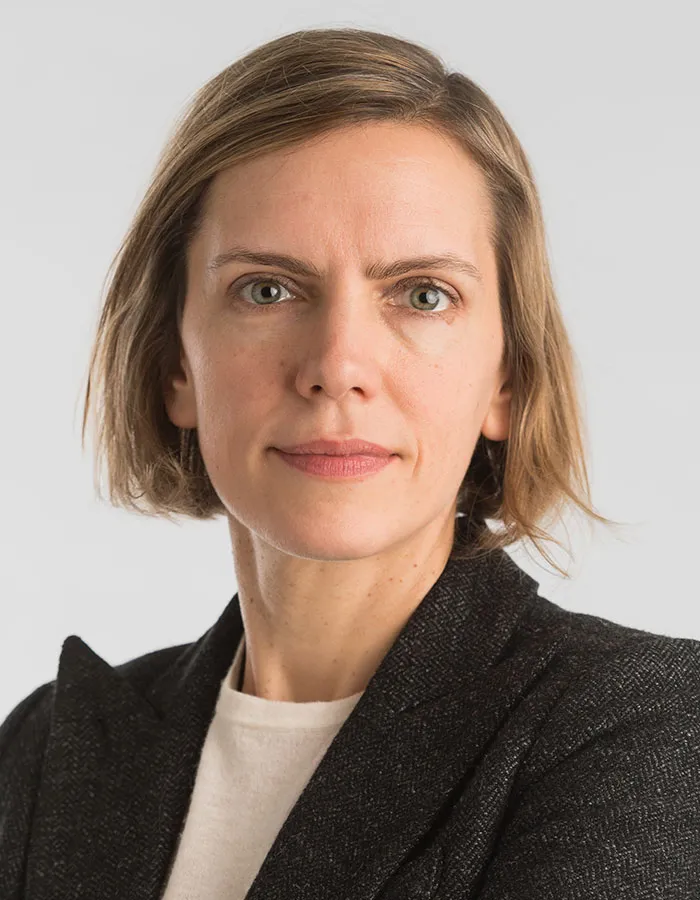
Kristina Daugirdas
Daugirdas—a professor of law and the associate dean for academic programming—teaches and writes in the fields of international law and institutions and US foreign relations law. Her scholarship focuses on how international law regulates (and fails to regulate) international institutions. She is a member of the US State Department’s Advisory Committee on International Law.
On the research side, I’m working on a new empirical project. Together with my co-author, we are constructing a data set of the charters of all of the different international organizations that we can get our hands on—400-some organizations. So much of the legal literature in this space focuses on American and European organizations: NATO, the European Union, the United Nations, and other UN-system organizations. Although those are the most salient, international lawyers don’t have a good idea of whether they’re representative of the population of international organizations as a whole. Our project is going to give traction on answering that question.
In particular, we’re interested in whether there are systematic differences in the kinds of organizations that more democratic versus more authoritarian governments create. In a moment where there is a lot of democratic backsliding worldwide, this project can shed light not only on what has been, but also what the future of the international legal system and international cooperation might look like.
I joined the faculty here in 2010, and in the area of international law, I would put Russia’s invasion of Ukraine as the most important development. The world has not done nothing in response, yet I also think the world has not done enough. How this especially brazen violation of the most fundamental rules of the international legal system is going to be resolved will tell us a lot about the future of international law and international coexistence.
I would point to the work that Roseanna Sommers has been doing about consent and the situations in which individuals give consent that is not effective for legal purposes or for moral purposes. My focus, of course, is international law, but I also teach 1L Contracts. Both treaties and contracts are voluntary agreements that are the product of consent, and that feature shapes so much of the surrounding law. So Roseanna's work, which really challenges and investigates when consent does and should count, is really valuable and fascinating.
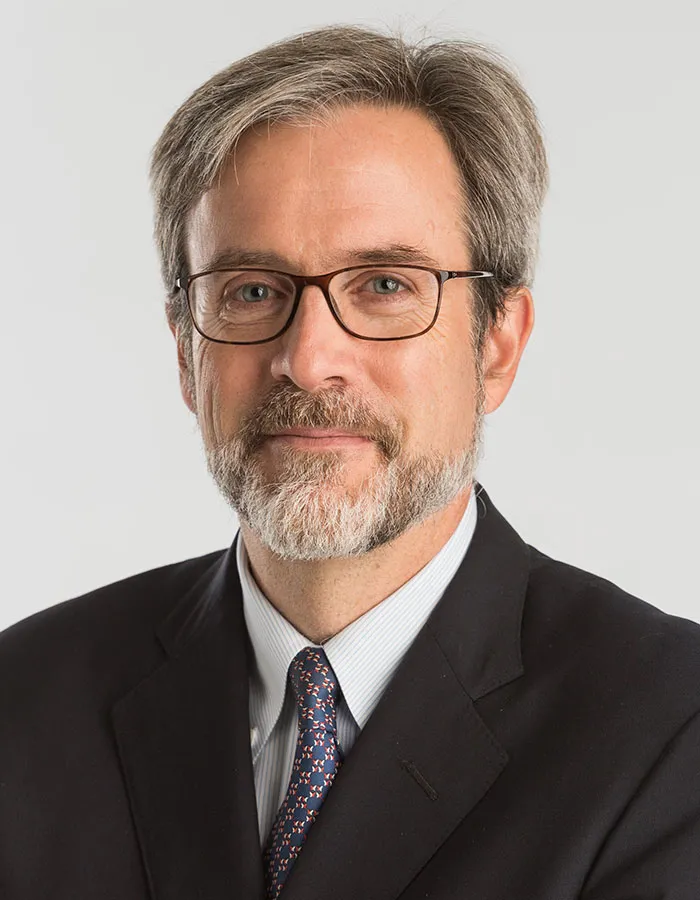
Nicholas Howson
Howson, the Pao Li Tsiang Professor of Law, has spent many years living in the People's Republic of China (PRC), both as a scholar and as a practicing lawyer based in Beijing. He writes and lectures widely on Chinese law topics, focusing on Chinese corporate law and securities regulation, the Chinese capital markets, Chinese legal history, and the development of constitutionalism in Greater China.
Ten years ago, I published an English-language law review article arguing that the government of the PRC, including state prosecutors, market regulators, and the courts, was enforcing China’s insider trading prohibition in contravention of Chinese law. The Supreme People’s Court of the PRC and the China Securities Regulatory Commission (China’s SEC) took heed of my critique, and in reaction issued an opinion changing enforcement against insider trading in the domestic capital markets, most significantly under the PRC Criminal Law. Now, more than a decade later, I am writing a new critique that shows continued illegal public enforcement against those trading on material, nonpublic, information in the Chinese markets and offers a legislative and jurisprudential solution to the problem I first raised.
I entered law academia 18 years ago only after rising to partnership in a large international firm and practice from offices in New York, London, Paris, and Beijing. Yet, my area of study—broadly defined as Chinese law and legal institutions—has seen a revolution over the more than three decades of my active legal career, with the creation in China of substantive law and regulation, legal and administrative institutions, a surprisingly autonomous and technically competent legal profession, and wholesale (but widely varying) changes in China’s political legal system. For just the last two decades as an academic, however, I would point to the creation and maintenance of a legal and regulatory system in China able to support and grow a market economy (albeit dominated by state-owned or -connected actors) and long-term investment by Chinese actors. The lack of development in the explicitly criminal law and social control spheres, including the protection of civil and political rights for Chinese citizens (including some ethnic minority populations), and indeed some retrenchment in those areas, is also significant, and in my view tragic.
I am reading, and enjoying, books by two of my colleagues: Adam Pritchard’s (with Bob Thompson of Georgetown Law) A History of Securities Law in the Supreme Court (Oxford, 2023) and Rachel Rothschild’s Poisonous Skies: Acid Rain and the Globalization of Pollution (Chicago, 2019). Adam’s book connects with my teaching the Securities Regulation course, as it tracks the radical shift in the US Supreme Court’s attitude toward securities regulation generally and private enforcement specifically. Rachel’s history is a study of the clash between science and politics regarding acid rain; the necessarily cross-border aspect of the issues raised (and the policy cure) is a model for my own study of cross-border regulatory dilemmas and solutions, equally infected by politics and diplomacy over technical expertise.
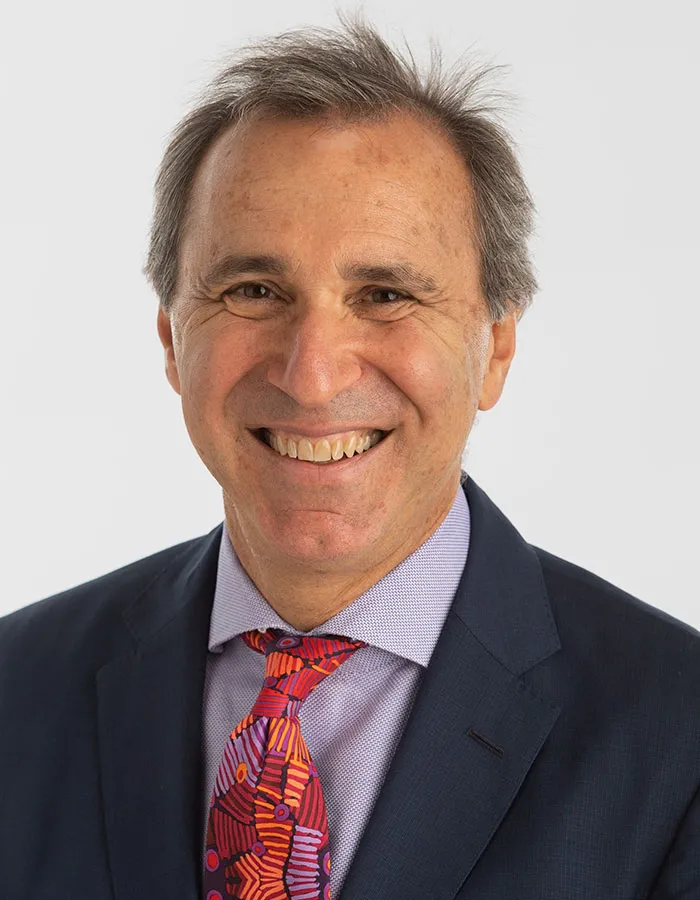
Steven Ratner
Ratner, the Bruno Simma Collegiate Professor of Law and director of the Donia Human Rights Center, teaches and writes on a range of issues, including state and corporate duties regarding foreign investment, territorial and ethnic-based disputes, civil and interstate armed conflict, and accountability for human rights violations. He also is interested in the intersection of international law and political philosophy.
For the last two years, I’ve been serving as a member of a three-person commission of inquiry created by the UN Human Rights Council to examine human rights violations in Ethiopia’s civil conflict and make recommendations for accountability and healing for victims. This is the third UN panel on which I’ve served, after working on both Cambodia and Sri Lanka. Our commission and staff face tremendous challenges because the Ethiopian government opposes international oversight and refuses to cooperate with us. The work requires legal expertise, of course, but mostly political and diplomatic skills as we navigate and advocate among supporters and opponents of our work. Our reports can make a difference by creating an impartial record and offering recommendations for the future, but only Ethiopia’s people and government, as well as other states, have the power to act on them.
When I started at the University of Texas School of Law in 1992, international law (IL) scholarship was doctrinally oriented, though US legal realists had been pushing away from that. The greatest change I’ve seen is the prominence of overtly interdisciplinary and critical approaches that have richly informed our understanding of the field. These include IL and international relations (IL/IR), law and economics, feminist approaches, critical legal studies, Third World approaches to international law, sociology and IL, and philosophy and IL. My own work in this space has been within IL/IR, in particular examining how global actors deploy international legal arguments outside of courts to persuade others, and IL and political philosophy, for imagining ways in which international law contributes to or detracts from various visions of global justice.
A few years ago, I read Ekow Yankah’s Punishing Them All: How Criminal Justice Should Account for Mass Incarceration (Res Philosophica, 2020). It was my first foray into reading about mass incarceration in the US and its racial causes and effects. Ekow did a masterful job of explaining how our justice system has become one for the haves and another for the have-nots, with enormous harms from jailing for the latter and their civic bonds with their communities. I particularly admired his ability to combine legal doctrine, social science research, political philosophy, and a clear message for reform in one article. I’m very glad he's now part of our faculty.
The Michigan Law faculty includes a number of experts in international and comparative law beyond the four who answered our questions for this feature. They include:
- Julian Arato, professor of law; director, Program on Law and the Global Economy; faculty director, Center for International and Comparative Law
- Laura Nyantung Beny, Earl Warren DeLano Professor of Law; associate director, University of Michigan African Studies Center
- Luis C.deBaca, ’93, professor from practice
- Christin M. Chinkin, L. Bates Lea Global Professor of Law
- Bruce W. Frier, John and Teresa D’Arms Distinguished University Professor Emeritus of Classics and Roman Law; professor emeritus of classical studies; professor emeritus of law
- Daniel H. Halberstam, Eric Stein Collegiate Professor of Law; director, European Legal Studies Program
- James C. Hathaway, James E. and Sarah A. Degan Professor Emeritus of Law
- Jennifer A. Haverkamp, professor from practice; Graham family director, University of Michigan Graham Institute for Sustainability
- Vikramaditya S. Khanna, William W. Cook Professor of Law
- Catharine A. MacKinnon, Elizabeth A. Long Professor of Law
- Julian David Mortenson, James G. Phillipp Professor of Law
- Susan D. Page, professor from practice; director, Weiser Diplomacy Center; professor of practice of international diplomacy, Gerald R. Ford School of Public Policy
- Anne Peters, L. Bates Lea Global Professor of Law
- John A.E. Pottow, John Philip Dawson Collegiate Professor of Law
- Mathias W. Reimann, Hessel E. Yntema Professor of Law
- Rebecca J. Scott, Charles Gibson Distinguished University Professor of History; professor of law
- Mark D. West, David A. Breach Dean of Law; Nippon Life Professor of Law


